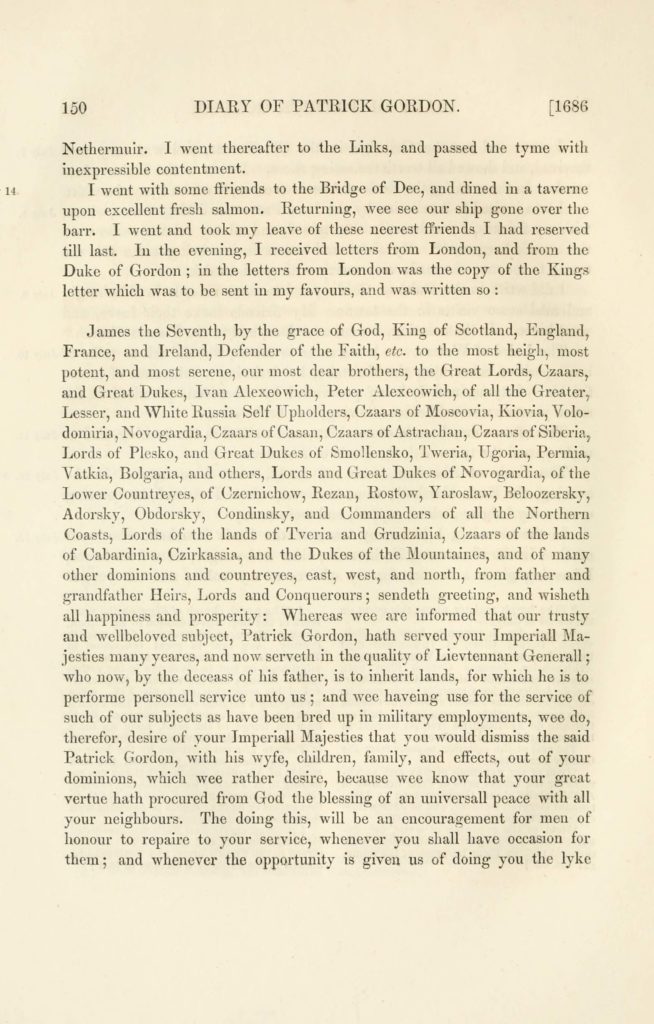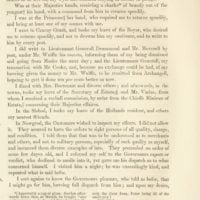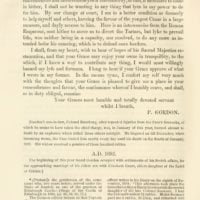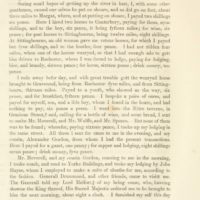
Related

110 DIARY OF PATRICK GORDON. [1686 I gave up my petition

174 DIARY OF PATRICK GORDON. [1692 be restored. As for Harie Gordon

180 DIARY OF PATRICK GORDON. [1692 countrey. I entreat you to gett Watertowne
![1686] DIARY OF PATRICK GORDON. 155 Crossing the Black River](https://cdn2.picryl.com/thumbnail/1699/12/31/1686-diary-of-patrick-gordon-155-crossing-the-black-river-daa006-200.jpeg)
1686] DIARY OF PATRICK GORDON. 155 Crossing the Black River
![1696] DIARY OF PATRICK GORDON. 185 for a just cause is rewarded](https://cdn2.picryl.com/thumbnail/1699/12/31/1696-diary-of-patrick-gordon-185-for-a-just-cause-is-rewarded-d5c23a-200.jpeg)
1696] DIARY OF PATRICK GORDON. 185 for a just cause is rewarded

126 DIARY OF PATRICK GORDON. [1686 religion* At night wee cast anchor
![1692] DIARY OF PATRICK GORDON. 179 Patrick Gordon of Cults](https://cdn2.picryl.com/thumbnail/1699/12/31/1692-diary-of-patrick-gordon-179-patrick-gordon-of-cults-aedde7-200.jpeg)
1692] DIARY OF PATRICK GORDON. 179 Patrick Gordon of Cults

166 DIARY OF PATRICK GORDON. [1669 The renewal of the war against the Crim Tartars
![1692] DIARY OF PATRICK GORDON. 177 I do this upon my unkles recommendation and advice](https://cdn2.picryl.com/thumbnail/1699/12/31/1692-diary-of-patrick-gordon-177-i-do-this-upon-my-unkles-recommendation-and-6cd4e6-200.jpeg)
1692] DIARY OF PATRICK GORDON. 177 I do this upon my unkles recommendation and advice
150 DIAEY OF PATRICK GORDON. [1686 Nethermuir. I went thereafter to the Links
Summary
Passages from the diary of General Patrick Gordon of Auchleuchries : A.D. 1635-A.D. 1699"
150 DIAEY OF PATRICK GORDON. [1686
Nethermuir. I went thereafter to the Links, and passed the tyme with
inexpressible contentment.
I went with some ffriends to the Bridge of Dee, and dined in a tavenie
upon excellent fresh salmon. Returning, wee see our ship gone over the
barr. I went and took my leave of these ueerest ffriends I had reserved
till last. In the evening, I received letters from London, and from the
Duke of Gordon ; in the letters from London was the copy of the Kings
letter which was to be sent in my favours, and was written so :
James the Seventh, by the grace of God, King of Scotland, England,
France, and Ireland, Defender of the Faith, etc. to the most heigh, most
potent, and most serene, our most dear brothers, the Great Lords, Czaars,
and Great Dukes, Ivan Alexeowich, Peter Alexeowich, of all the Greater,
Lesser, and White Russia Self Upholders, Czaars of Moscovia, Kiovia, Volo-
domiria,Novogardia, Czaars of Casan, Czaars of Astrachan, Czaars of Siberia.
Lords of Plesko, and Great Dukes of SmoUensko, Tweria, ITgoria, Permia,
Vatkia, Bolffaria, and others, Lords and Great Dukes of Novogardia, of the
Lower Countreyes, of Czernichow, Rezan, Rostow, Yaroslaw, Beloozersky,
Adorsky, Obdorsky, Condinsky, and Commanders of all the Northern
Coasts, Lords of the lands of Tveria and Grudzinia, (Jzaars of the lands
of Cabardinia, Czirkassia, and the Dukes of the Mountaines, and of many
other dominions and countreyes, east, west, and north, from father and
grandfather Heirs, Lords and Conquerours ; sendeth greeting, and wisheth
all happiness and prosperity : Whereas wee are informed that our trusty
and wellbeloved subject, Patrick Gordon, hath served your Imperlall Ma-
jesties many yeares, and now serveth in the quality of Lievtennant Generall ;
who now, by the deceass of his father, is to inherit lands, for which he is to
performe personell service unto us ; and wee haveing use for the service of
such of our subjects as have been bred up in military employments, wee do,
therefor, desire of your Tmperiall Majesties that you would dismiss the said
Patrick Gordon, with his Avyfe, children, family, and effects, out of your
dominions, which wee rather desire, because wee know that your great
vertue hath procured from God the blessing of an universall peace with all
your neiglibours. The doing this, will be an encouragement for men of
honour to repaire to your service, whenever you shall have occasion for
them ; and whenever the opportunity is given us of doing you the lyke
Gordon was brought up and remained a lifelong Roman Catholic, at a time when the Church was being persecuted in Scotland. At age of fifteen, he entered the Jesuit college at Braunsberg, East Prussia, then part of Poland. In 1661, after many years experiences as a soldier of fortune, he joined the Russian army under Tsar Aleksei I, and in 1665 was sent on a special mission to England. After his return, he distinguished himself in several wars against the Turks and Tatars in southern Russia. In recognition of his service he was promoted to major-general in 1678, was appointed to the high command at Kiev in 1679, and in 1683 was made lieutenant-general. In 1687 and 1689 he took part in expeditions against the Tatars in the Crimea, being made a full general. Later in 1689, a revolution broke out in Moscow, and with the troops under his command, Gordon virtually decided events in favor of Peter the Great against the Regent, Tsarevna Sophia Alekseyevna. Consequently, he was for the remainder of his life in high favor with the Tsar, who confided to him the command of his capital during his absence from Russia. In 1696, Gordon's design of a "moveable rampart" played a key role in helping the Russians take Azov. One of Gordon's convinced the Tsars to establish the first Roman Catholic church and school in Muscovy, of which he remained the main benefactor and headed the Catholic community in Russia until his death. For his services his second son James, brigadier of the Russian army, was created Count of the Holy Roman Empire in 1701. At the end of his life the Tsar, who had visited Gordon frequently during his illness, was with him when he died, and with his own hands closed his eyes. General Gordon left behind him a uniquely detailed diary of his life and times, written in English. This is preserved in manuscript in the Russian State Military Archive in Moscow. Passages from the Diary of General Patrick Gordon of Auchleuchries (1635–1699) was printed, under the editorship of Joseph Robertson, for the Spalding Club, at Aberdeen, Scotland, 1859.
